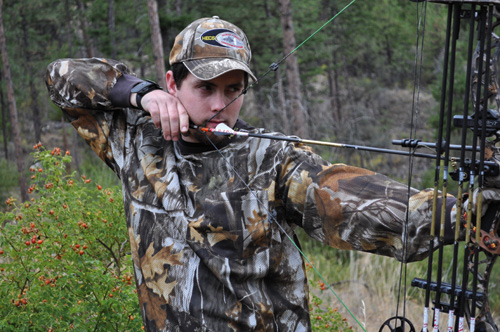 Human Energy Concealment Systems specializes in gear that conceals hunters’ electromagnetic fields from prey.
Human Energy Concealment Systems specializes in gear that conceals hunters’ electromagnetic fields from prey.
 |
HECS hunting suits are designed to outwit the “sixth sense” that helps prey animals identify danger and flee. // Photo courtesy HECS |
Mike Slinkard was born and raised in John Day, and like most of his peers he went straight from high school to a job in the woods. Those jobs didn’t last. Rather than cling to what was left of the local timber industry, Slinkard turned his passion for bow hunting into his livelihood.
He started with a shop in town. Then in 2000 he launched Winner’s Choice Custom Bow Strings, which has grown to $3 million in annual sales and 38 employees. His latest venture is Human Energy Concealment Systems, an apparel company focused on blocking the electromagnetic field emitted by the human body.
The idea came from a conversation with employee and fellow bow hunter Max Maupin about the “sixth sense” that enables prey animals to escape danger. Maupin put his degree in animal science to work and tracked down a study that showed how cud-chewing animals respond to minor changes in electromagnetic fields as a survival mechanism.
Slinkard and Maupin designed a hunting suit with electricity-conducting carbon woven into a grid to block the electromagnetic field (prices start at $149). A partnership with a New Zealand fabric company and a Taiwanese factory followed, and they released their HECS hunting suit at a national archery trade show in Columbus, Ohio, in 2010.
Slinkard promoted the product with full-page ads in archery publications and television spots on outdoor channels. Sales started slow, then picked up with the fall hunting season. Returning to this year’s archery show, Slinkard found reviews were positive. “We still have some skeptics, but they aren’t people who have tried it,” he says.
Slinkard, 45, imports the hunting suits fully made and ships them to market from John Day. But he may manufacture locally if his other ideas take off. The company has five patents pending, one of which covers wetsuits for diving and surfing, to protect people from sharks. He also has an agreement with a Virginia Beach-based company to handle military contracts (think Navy Seals).
If he can land a military contract, “Buy American” requirements would bring new jobs to Grant County, where unemployment is 14.3% and Slinkard is one of just two tenants at the John Day Industrial Park.
“It’s going to be a worldwide company,” he predicts. “There’s no doubt about it.”


